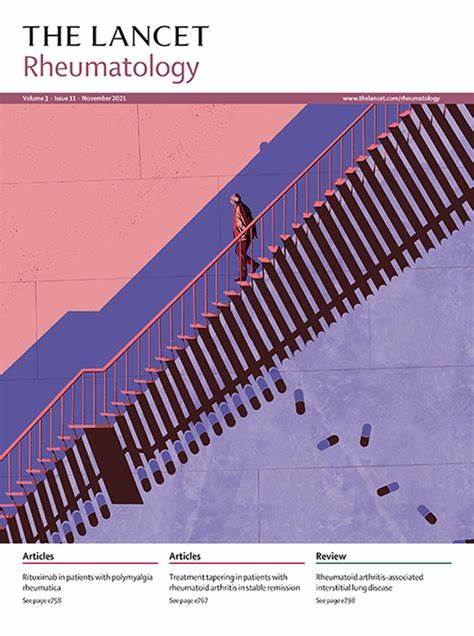Allogeneic umbilical cord-derived mesenchymal stromal cells as treatment for systemic lupus erythematosus: a single-centre, open-label, dose-escalation, phase 1 study
IF 16.4
1区 医学
Q1 RHEUMATOLOGY
引用次数: 0
Abstract
Background
Patients with systemic lupus erythematosus (SLE) with inadequate responses to standard therapies have unmet therapeutic needs. The immunomodulatory, proangiogenic, and antifibrotic properties of mesenchymal stromal cells support their use in treating patients with SLE. We aimed to assess the safety of a single intravenous infusion of allogeneic umbilical cord-derived mesenchymal stromal cells in patients with severe SLE.
Methods
This prospective, single-centre, open-label, dose-escalation, Bayesian phase 1 study was done at the Saint-Louis University Hospital (Paris, France). Eligible patients were aged 18–70 years, were diagnosed with SLE according to American College of Rheumatology criteria with positive antinuclear antibodies, had a baseline Safety of Estrogens in Lupus Erythematosus National Assessment–SLE Disease Activity Index (SELENA-SLEDAI) score of 6 or more, and had disease that was refractory to first and second line SLE therapies. Patients were to receive a single intravenous infusion of 1 × 106, 2 × 106, or 4 × 106 umbilical cord-derived mesenchymal stromal cells per kg (manufactured from a single umbilical cord) in cohorts of five patients per dose, starting at 2 × 106 cells per kg. The primary endpoint was the rate of treatment-related severe adverse events (grade ≥3) in the first 10 days after infusion of umbilical cord-derived mesenchymal stromal cells. People with lived experience were involved in study design, patient enrolment, and dissemination of the study findings. This study is registered with ClinicalTrials.gov, NCT03562065, and the EU Clinical Trials Register, EudraCT2017-001400-29.
Findings
From May 14, 2019, to March 6, 2023, 29 patients were screened for eligibility, eight of whom were enrolled in the study. Enrolment was terminated early after inclusion of eight patients and no patients received the 1 × 106 dose of umbilical cord-derived mesenchymal stromal cells. Seven (88%) of eight participants were cisgender women and one (13%) was a cisgender man. The median age was 35 years (range 26–57) and the median SLE disease duration was 12 years (5–19). All patients received at least 2 × 106 cells per kg (range 2 × 106 to 4 × 106). No severe adverse events and three infusion-related adverse events (two grade 1 and one grade 2) occurred in two patients in the first 10 days after infusion. After 12·4 months (range 12–13) of follow-up, no treatment-related severe adverse events and three non-treatment-related severe adverse events occurred in one patient after relapse.
Interpretation
Our results suggest that a single infusion of 2 × 106 cells per kg or 4 × 106 cells per kg of allogeneic umbilical cord-derived mesenchymal stromal cells was safe in patients with severe SLE. Placebo-controlled trials are needed to confirm clinical efficacy and the role of B-cell modifications in clinical benefit.
Funding
Fondation du Rein, Alliance Maladies Rares AFM-Téléthon, Direction de la Recherche Clinique et de l’Innovation AP-HP, and ANR eCellFrance.
异体脐带间充质间质细胞治疗系统性红斑狼疮:一项单中心、开放标签、剂量递增的1期研究
背景:对标准治疗反应不足的系统性红斑狼疮(SLE)患者的治疗需求未得到满足。间充质间质细胞的免疫调节、促血管生成和抗纤维化特性支持其在SLE患者治疗中的应用。我们的目的是评估单次静脉输注同种异体脐带间充质间质细胞治疗严重SLE患者的安全性。方法:这项前瞻性、单中心、开放标签、剂量递增、贝叶斯1期研究在法国巴黎的圣路易斯大学医院完成。符合条件的患者年龄为18-70岁,根据美国风湿病学会标准诊断为SLE,抗核抗体阳性,基线雌激素在红斑狼疮国家评估-SLE疾病活动指数(SELENA-SLEDAI)中的安全性评分为6分或以上,并且患有一线和二线SLE治疗难治性疾病。患者接受单次静脉输注每公斤1 × 106、2 × 106或4 × 106脐带来源的间充质间质细胞(由单个脐带制造),每剂量5例患者,从每公斤2 × 106细胞开始。主要终点是输注脐带源性间充质间质细胞后10天内治疗相关严重不良事件(≥3级)的发生率。有生活经验的人参与了研究设计、患者登记和研究结果的传播。该研究已在ClinicalTrials.gov注册,注册号为NCT03562065,欧盟临床试验注册号为EudraCT2017-001400-29。研究结果:从2019年5月14日至2023年3月6日,29名患者进行了资格筛选,其中8名患者入组研究。纳入8例患者后,研究提前终止,没有患者接受1 × 106剂量的脐带间充质间质细胞治疗。8名参与者中有7名(88%)是顺性女性,1名(13%)是顺性男性。中位年龄为35岁(范围26-57岁),SLE病程中位为12年(5-19年)。所有患者每公斤至少接受2 × 106个细胞(范围为2 × 106至4 × 106)。2例患者在输注后10天内未发生严重不良事件,3例输注相关不良事件(2例1级和1例2级)。随访12·4个月(12-13个月),1例患者复发后无治疗相关严重不良事件发生,3例非治疗相关严重不良事件发生。解释:我们的结果表明,单次输注2 × 106细胞/ kg或4 × 106细胞/ kg的同种异体脐带间充质间质细胞对严重SLE患者是安全的。需要安慰剂对照试验来证实临床疗效和b细胞修饰在临床获益中的作用。资助:雷因基金会、afm - tama - tama联盟、AP-HP临床和创新研究方向和法国ANR eCellFrance。
本文章由计算机程序翻译,如有差异,请以英文原文为准。
求助全文
约1分钟内获得全文
求助全文
来源期刊

Lancet Rheumatology
RHEUMATOLOGY-
CiteScore
34.70
自引率
3.10%
发文量
279
期刊介绍:
The Lancet Rheumatology, an independent journal, is dedicated to publishing content relevant to rheumatology specialists worldwide. It focuses on studies that advance clinical practice, challenge existing norms, and advocate for changes in health policy. The journal covers clinical research, particularly clinical trials, expert reviews, and thought-provoking commentary on the diagnosis, classification, management, and prevention of rheumatic diseases, including arthritis, musculoskeletal disorders, connective tissue diseases, and immune system disorders. Additionally, it publishes high-quality translational studies supported by robust clinical data, prioritizing those that identify potential new therapeutic targets, advance precision medicine efforts, or directly contribute to future clinical trials.
With its strong clinical orientation, The Lancet Rheumatology serves as an independent voice for the rheumatology community, advocating strongly for the enhancement of patients' lives affected by rheumatic diseases worldwide.
 求助内容:
求助内容: 应助结果提醒方式:
应助结果提醒方式:


